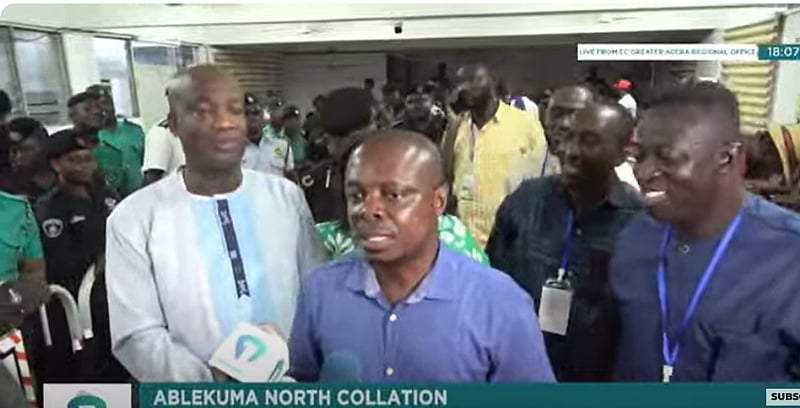The Ablekuma North constituency election in Ghana has been mired in controversy, culminating in the resignation of the Returning Officer, Vincent Obeng, amidst allegations of result manipulation and procedural irregularities. Obeng cited frustrations with the collation process as the reason for his departure, specifically highlighting difficulties in verifying results from three remaining polling stations out of the original seven outstanding. Two presiding officers were unable to authenticate their submitted documents, while a third failed to appear altogether. This breakdown in procedure, occurring after the collation of results from four polling stations, led Obeng to declare his withdrawal from the process, requesting the Electoral Commission (EC) to appoint a replacement. His public statement underscored the gravity of the situation, expressing his disappointment and effectively washing his hands of the Ablekuma North election.
The EC’s Director of Training, Dr. Serebour Quaicoe, expressed regret over Obeng’s resignation, acknowledging the disruption it caused to the already tense electoral process. The resignation came against a backdrop of accusations leveled by the National Democratic Congress (NDC) against the EC, alleging collusion with the New Patriotic Party (NPP) to manipulate the election results. These accusations fueled the chaotic scenes that erupted at the Greater Accra Regional Office during the resumed collation process. The NDC’s Constituency Organiser, Musa Kalamu, specifically accused the EC of facilitating the alteration of figures on pink sheets – the official record of polling station results – from the outstanding polling stations. This claim added another layer of complexity to the already fraught situation, further undermining trust in the electoral process.
The controversy surrounding the Ablekuma North election highlights the challenges faced by the EC in ensuring a transparent and credible electoral process. The inability of presiding officers to authenticate their own submitted results raises serious questions about the integrity of the data and the potential for manipulation. The fact that one presiding officer failed to appear further complicates matters and adds to the suspicion surrounding the results. These irregularities, combined with the public resignation of the Returning Officer and the accusations of partisan interference, cast a shadow over the legitimacy of the election outcome.
The EC’s decision to suspend the collation process on January 6th, in order to verify the results from the seven outstanding polling stations, underscores the seriousness of the discrepancies. Prior to the suspension, 13 out of 20 outstanding pink sheets had been successfully authenticated by presiding officers, all submitted by the NPP. This fact, coupled with the NDC’s accusations, contributes to the perception of bias and fuels the distrust in the EC’s handling of the situation. The delay in finalizing the results and the surrounding controversy create an environment ripe for speculation and further erode public confidence in the electoral system.
The situation in Ablekuma North reflects broader concerns about electoral integrity in Ghana. The allegations of manipulation, the procedural breakdowns, and the resignation of the Returning Officer highlight vulnerabilities in the system and the need for strengthened oversight and accountability mechanisms. The EC’s response to this crisis will be crucial in restoring public trust and ensuring the credibility of future elections. A thorough and transparent investigation into the alleged irregularities is essential, along with measures to address the systemic issues that contributed to this situation.
Going forward, the EC must prioritize strengthening training for electoral officials, particularly presiding officers, to ensure they understand and adhere to proper procedures for handling and documenting election results. Clear protocols for verifying and authenticating results must be enforced, and mechanisms for addressing discrepancies and challenges must be robust and transparent. Furthermore, fostering open communication and collaboration with all political parties is crucial to building trust and ensuring a fair and credible electoral process. The events in Ablekuma North serve as a stark reminder of the importance of continuous improvement and reform in electoral management to uphold the principles of democracy and ensure the will of the people is accurately reflected in election outcomes.


